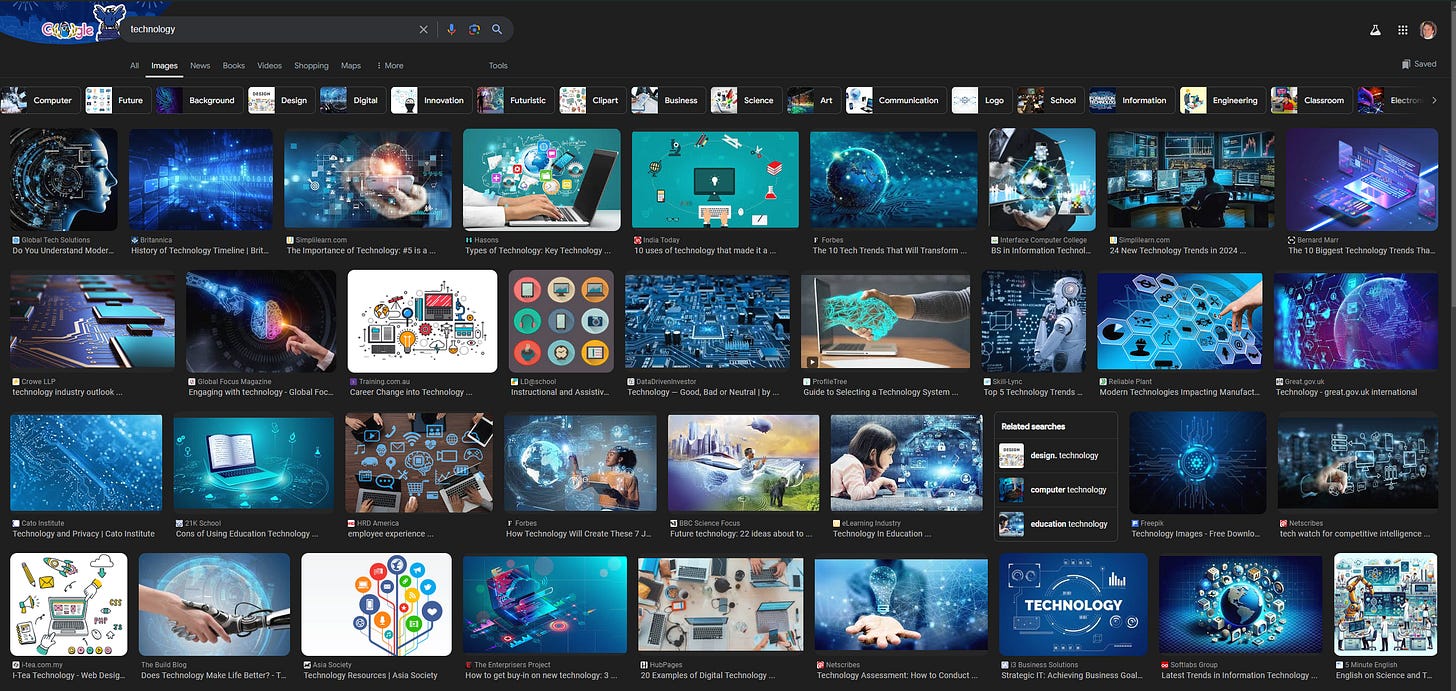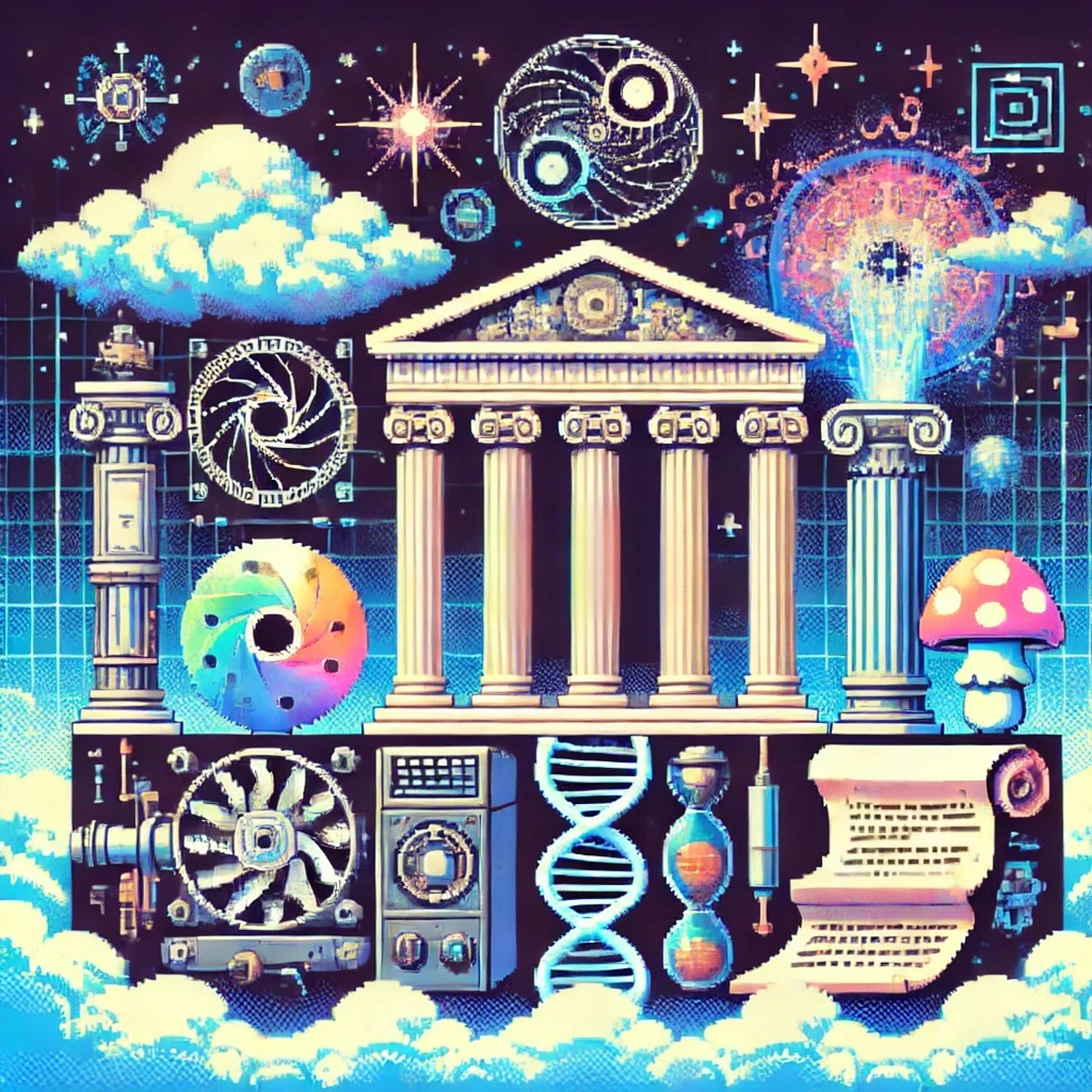Words are humanity's cornerstone for cooperation, laying the foundation for our collective journey towards a desirable future.
We often forget that comprehension and our alignment of words are approximations. The definitions and images I conjure from hearing or reading a word may differ slightly or drastically from yours.
Technology is a word with a relatively well-aligned meaning in our modern era.
When I hear 'technology,' images such as phones, computers, websites, robots, AI, and rockets come to mind—primarily electronics and software. In fact, when I Google image search for "technology," nine rows of images are nearly identical stock images of or relating to computers, robots, and software.
Our idea of technology is limited, so today, we will explore the origin and evolution of how we arrived at our modern formulation of technology. Returning to the origin will allow us to investigate the definition and expand our minds about what we conceive of as a technology, allowing us to freely explore spaces with untapped potential for creation and innovation into the future.
Let's start by taking a trip back to Ancient Greece.
Evolution of “Technology”
The word technology is derived from the Greek words techne and logia (logos). Seminal Greek philosophers Socrates, Plato, and Aristotle debated and rigorously discussed both.
Socrates and Plato viewed techne as interchangeable with episteme (knowledge or understanding).
Techne meant art, skill, craft, and technique. For Socrates, techne encompassed acts like playing the flute, dancing, medicine, math, ruling, housebuilding, running a household, and farming. Plato added nuance to the idea by suggesting the craft was separate from what the craft accomplished.
Aristotle viewed techne and episteme as separate. For him, techne was about the craft and the production through the craft - including the process and the product. Here, we see glimmers of our modern use of the word.
Logia (or logos) means the study of knowledge. Interestingly, logia originally meant divine communication. In fact, the idea of logos is something that is associated with Jesus Christ in the Christian tradition1, as it places the idea of the ability to wield free and authentic speech in pursuit of truth as fundamental.
Together, techne and logia mean "the application of knowledge to a specific skill or craft for the production of its domain."
The word's origin resonates as congruent with reality. Technology feels like the product of a craft from a divine origin. In fact, if that were the definition, it would only make sense. Go back 500 years and place an AC unit in the castle of a random noble family—they would undoubtedly think that God has dropped a gift on their doorstep.
Moving forward from ancient Greece, it wasn't until the 17th century that the word technology surfaced in English.
In a short time, we get the steam engine, the first chemical battery, the telegraph, gas-powered vehicles, commercial computers, the internet, the iPhone, ChatGPT, and the Frontier Letter (hehe).

The idea isn't to highlight our history of technology but rather the innovations to which we apply the word' technology.'
We now arrive at our modern definition of technology: the practical application of knowledge especially in a particular area; the capability given by the practical application of knowledge2.
This definition is quite close to the origin of techne and logia. However, as a culture, we don't seem to apply this definition broadly but rather from an electronic and computer science point of view.
This historical journey brings us to today, where I propose we expand our scope of consciousness to perceive technology in a far more encompassing light.
Proper Way to Approach Technology
I receive a daily email based on computer code I wrote, with a link to a Google form I created. That form allows me to journal, reflect on my emotional state, and document my dreams. In April of this year, I was hit by a ton of bricks when I realized that I had been repressing a positive part of me.
I had a series of dreams I could analyze and subsequently journal and reflect on this behavior. By doing this, I could stop this repression, which had an onslaught of positive downstream effects, thus producing a new and improved state of being.
Through those sentences, we tend to only view the code, email, and Google form as the technology.
Why stop there?
In my example, dream analysis is the application of psychological knowledge to produce a new state of being. Is it not a technology by definition of the word?
I would argue it is.
I previously suggested that we should view the Individuation process as a technology. It is the application of psychological knowledge to behavioral implementations to produce an improved state of being.
What about the process of engaging with stories, myths, and religions?
Stories serve many functions; notably, they help us make sense of novel occurrences and behaviors, foster shared experiences, and transmit survival-relevant information without requiring firsthand acquisition.
Religious and mythological stories serve these functions more fundamentally. The ideas have been refined over significant timeframes, aiming to communicate learnings of potential universal morals and guide behavior so that individuals and society can live optimally.
This process is intricately linked to our dynamic and constantly evolving memory system. Stories influence our behavior through a complex interplay between our procedural memory, where we unconsciously act out learned behaviors, and our episodic memory, where we store personal experiences. These memories are then discussed and debated in our semantic memory, further shaping our behavior in novel ways.
The cycle of story influence is self-reinforcing. As humans adopt new behaviors that enhance adaptability, these behaviors eventually become stories. If a behavior proves to be universally adaptive, it often becomes codified into religious doctrine, further solidifying its influence on society.
"Behavior is imitated, then abstracted into play, formalized into drama and story, crystalized into myth and codified into religion-and only then criticized in philosophy, and provided, post-hoc, with rational underpinnings."3
This is represented below.
So, there is a way in which one can interact with a story to produce a new mode of being.
For a more tangible example, we can look at ancient structures which we don't understand how they came to be. Is it possible that humans from thousands of years ago had technology unknown to us? Our narrow view of technology makes it hard to expand our vision to the idea that humans at one point possessed advanced technologies we can't understand, given our narrow definition.


At a minimum, we should differentiate domains into realms of technology and regard those as worthwhile—maybe things like individuation and religious rituals should fall into the bucket of psycho-technology.
It's useful to approach technology this way for two primary reasons:
It's logically accurate
It serves us better in the imagination and creation of new technologies.
What emerges as a technology only does so insofar as we think something in that domain can be a technology!
Through the Frontier Letter, I explore how emerging technologies have affected and will affect humans. From this, I examine how they currently affect us and try to ideate new technologies that can benefit us!
As we dilate the vessel of perceived technological innovation, the horizon of what's possible will become ever-apparent to us. I will explore technologies in the context described here—I don't limit myself to only electronics and software; I will also investigate myths, practices, and substances that alter our state of being.
Thank you for reading! If you have made it this far, subscribe if you have not already done so, and never miss a letter from the Frontier!
I hope you all have a lovely week.
Take care of yourself, everyone.
Dom
https://en.wikipedia.org/wiki/Logos_(Christianity)#
Merriam-Webster definition used – There are 3 different definitions, I applied 1a and 1b in this piece.
Jordan B. Peterson, Maps of Meaning, pg.78












It's interesting to frame technology as knowledge that enables. I've been reading about the science of dreams - dreams themselves were first an accepted technology (e.g. ancient Greece) but got increasingly devalued as mysticism. Only in the last few decades has it been propped back up, particularly by neuroscience. Makes you wonder what else is currently taken for granted.